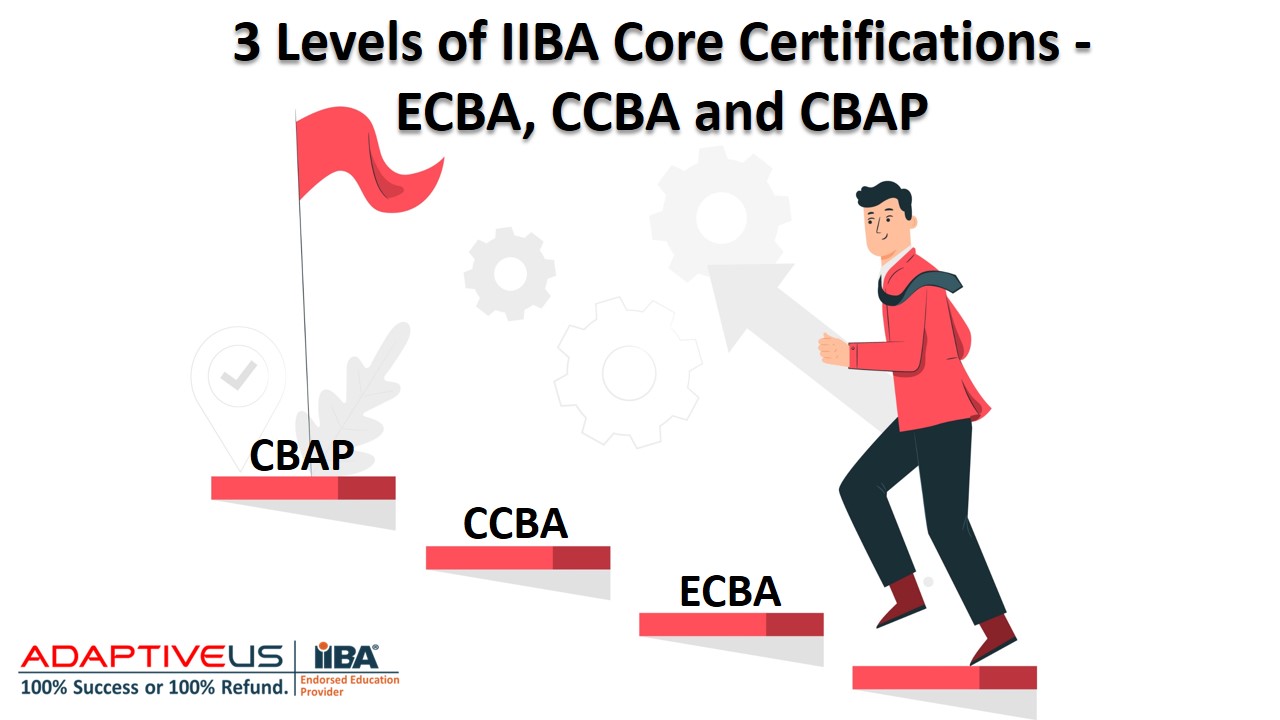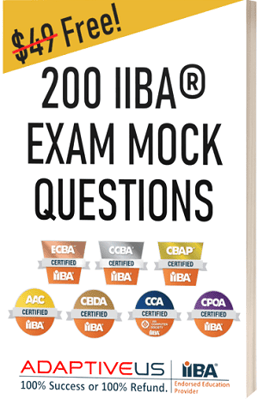Everything You Wanted to Know About IIBA Certifications

Below are some of the common questions we come across very frequently after IIBA has released the new multi-level Business Analysis certification scheme in the second half of 2016;
- What’s the difference between ECBA, CCBA, and CBAP Certification?
- Which certification should I pursue ECBA, CCBA, or CBAP?
- How do I know which certification is right/suited for me?
- There are so many certifications I am completely confused about which one to pursue?
- Can you please guide me on which certification should I go for?
The four certification levels are designed to suit the needs of business analysis professionals at various different levels.
- Level 1 – ECBA (Entry Certificate in business analysis)
- Level 2 – CCBA (Certification of capability in business analysis)
- Level 3 – CBAP (Certified business analysis professional)
Primarily aimed at beginners to senior and seasoned business analysis professionals these certifications test the Business Analyst knowledge and skill of professionals at varying levels.
Here’s a snapshot of the IIBA Certification Overview presented in a high-level comparative manner:

IIBA Certification Overview
IIBA Certifications Overview - This post will give an overview of various IIBA certifications like work experience requirements, eligibility, examination pattern, fees, training, reference, question patterns.
|
Full-Form |
|
|
ECBA |
|
|
CCBA |
|
|
CBAP |
|
|
Caters to |
|
|
ECBA |
Recognizes individuals entering the field of business analysis |
|
CCBA |
Recognizes BA professionals who have 2-3 years of BA experience |
|
CBAP |
Recognizes BA professionals who lead and have over 5 years of BA experience |
|
Target Audience |
|
|
ECBA |
Individuals entering the BA profession New graduates Professionals aiming to switch over to a BA career |
|
CCBA |
BA professionals having 2/3 years of experience Developing BAs, Hybrid BAs - PMs, Testers, QA, Change Manager, Tech Lead |
|
CBAP |
Aimed towards BA professionals having 5 years of experience Seasoned BAs, BA Consultants, Trainers, Business analysis, Systems analysis, Requirements analysis or management, Process management, Consulting |
|
Eligibility |
|
|
ECBA |
|
|
CCBA |
|
|
CBAP |
|
|
PD Hours |
|
|
ECBA |
21 in the last 4 years |
|
CCBA |
21 in the last 4 years |
|
CBAP |
35 in the last 4 years |
|
References |
|
|
ECBA |
Not needed |
|
CCBA |
2 from a career manager, client, or CBAP® recipient |
|
CBAP |
2 from a career manager, client, or CBAP® recipient |
|
Focuses on |
|
|
ECBA |
|
|
CCBA |
|
|
CBAP |
|
|
Exam Pattern |
|
|
ECBA |
|
|
CCBA |
|
|
CBAP |
|
|
Rewrite |
|
|
ECBA |
Twice within one year of approval with no wait time |
|
CCBA |
Twice within one year of approval with no wait time |
|
CBAP |
Twice within one year of approval with no wait time |
|
Rewrite/Retake Fees |
|
|
ECBA |
|
|
CCBA |
|
|
CBAP |
|
|
Application Fee |
|
|
CCBA |
145 USD |
|
CBAP |
145 USD |
|
Certification Fee |
|
|
ECBA |
|
|
CCBA |
|
|
CBAP |
|
|
Membership Fees for all 3 Certifications |
|
|
|
I sincerely hope this will help you in giving a good snapshot of the IIBA multi-level certifications overview.
Using this IIBA Certification Overview you can decide what would be the right Business Analysis certification for you.
In case you are a business analyst with 5/6+ years of business analysis experience and thinking of CBAP then take a look at this post on how to prepare for CBAP and CBAP on BABoKV3.
In case you are a mid-level business analyst with 3+ years of business analysis experience, then CCBA may be the right Business Analysis certification for you.
If you are a beginner business analyst with no or 1+ years of business analysis experience then ECBA may be the right certification for you, then take a look at this Chicken and Egg, Certification or experience in Business Analysis and also this beautiful video on Introduction to ECBA certification.
Take a look at the sample learning video on the BA planning approach from the collection of 95+ learning videos as part of our BABoK V3 study content.
Happy reading and please share it in your network if you like my writing and the post.

You May Also Like
These Related Stories

IIBA Certifications : Which one is right for you in 2025?

How to choose the right BA Certification?


No Comments Yet
Let us know what you think